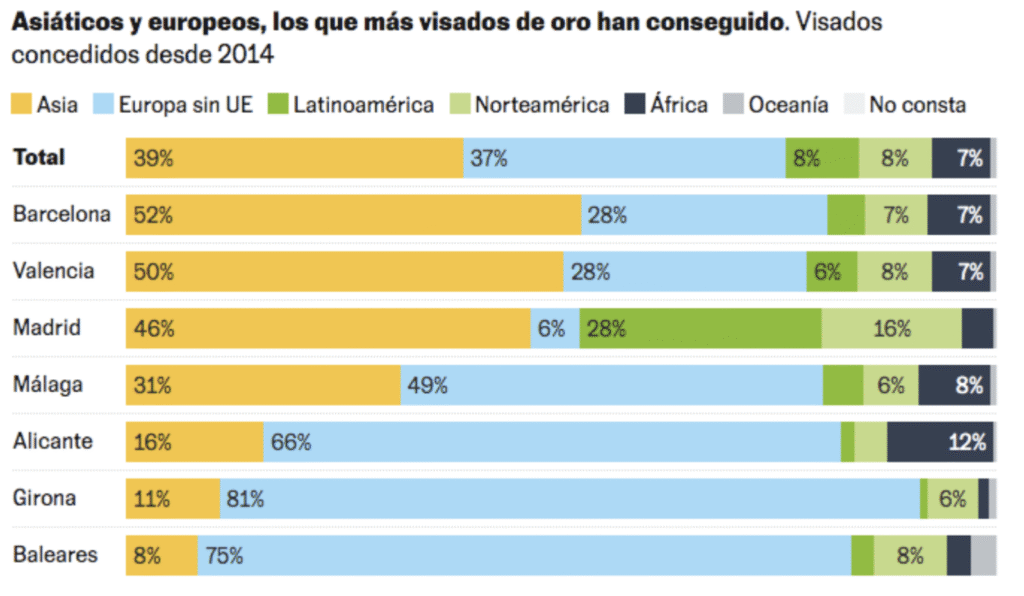Introduction
In April 2025, Spain officially repealed the Golden Visa scheme, a measure that allowed foreign investors to obtain a residence permit in return for (among other things) a property investment of at least €500,000.
This decision marks a shift in Spanish migration policy, and raises many questions about its effects on foreign investment.
Terreta Spain explains this change of direction.

Farewell to the "Golden Visa": it will no longer be possible to obtain a residence permit by investing in real estate.
Source: El País
Spain's Golden Visa before 2025
The Golden Visa program came into force in Spain in 2013(Law 14/2013), at the height of the Spanish recession, and has just come to an end, just over 12 years later, in the midst of the housing crisis.
PRIE (Programme de Résidence pour les Investisseurs et les Entrepreneurs) enabled non-EU residents and their families to obtain a one-year visa, followed by a 3-year renewable residence permit on condition that they maintained their investment:
- 500,000 in real estate (excluding loans, taxes).
- Creation of a job-creating business.
- Investment of €1 million in shares or bank deposits, or €2 million in public debt.
Holders of the "golden passport" also benefited from the right to work, education, health care and free movement within the Schengen area, as well as access to permanent residence and nationality after 10 years in the country. In short: the grail for many investors.
For the Spanish authorities, the aim was simple and honorable: to boost the country's economy.
Reasons for stopping the program in 2025
This type of program, in force in some sixty countries around the world, is increasingly criticized within the EU. After the UK and Ireland, it's now Spain's turn to put an end to it. Since April 3, 2025, no gold visas are issued in the country.
This deletion addresses several concerns:
- Growing real estate pressure, particularly in Barcelona and Madrid, where Golden Visas have contributed to soaring property prices, to the detriment of Spanish residents.
- A desire to align with European directives, aimed at limiting financial speculation.
- Increased risk of money laundering and tax evasion.
- Free movement within Schengen, perceived as a security loophole.
- The fear that the system indirectly facilitates the financing of terrorist organizations.
Key figures for the scheme to date
- 2013-2025: period during which the Golden Visa program was in force.
- April 3, 2025: official end date for the scheme.
- In Spain, 22,430 Golden Visas have been issued up to the beginning of 2025(Ministry of Inclusion, Social Security and Migration).
- 93% of demand was concentrated in the main provinces: Madrid, Barcelona, Malaga, Alicante, the Balearic Islands, Girona and Valencia.
- Golden Visas account for just 0.3% of the total residential market in Spain (Idealista).

Legend: Number of Golden Visas granted since its creation
Source: El País / Permanent Immigration Observatory of the Ministry of Inclusion, Social Security and Migration.

Legend: Percentage of golden visas by nationality
Source: El País / Permanent Immigration Observatory of the Ministry of Inclusion, Social Security and Migration.
If you'd like to find out more about investing in Spain, make an appointment with one of our experts.
Effects of the abolition of Golden Visas on investors
New requests closed
Since April 3, 2025, it has been impossible to apply for a Golden Visa in Spain.
Maintaining rights for beneficiaries
Applications submitted before the deadline will be processed as normal, and current holders may renew their visas provided they meet the original conditions.
Market perception
The announcement of the abolition of the Golden Visa did not cause an immediate drop in foreign demand. Non-Spanish buyers purchased 14.6% of the properties available on the market in 2024 (Idealista).
Spain remains very attractive thanks to its climate, living environment and attractive rental yields (6.5% in the second quarter of 2025 according to Fotocasa).
Prospects for foreign investors
The abolition of the Golden Visa does not mean the end of foreign property investment in Spain. It remains perfectly legal for a non-resident to buy property, but this purchase no longer automatically qualifies for a residence permit.
There are alternatives, depending on the profile:
- Non-profit visa: without professional activity, but with sufficient resources.
- Entrepreneur visa or employee visa.
- Family reunification, if a relative is legally resident in Spain.
Do you have a real estate investment project in Spain? Contact our experts.
To find out how to obtain a mortgage in Spain, click here: "Mortgages in Spain for non-residents, the complete guide". And if you're wondering what's involved in investing in Spain, read our complete guide.
FAQ : Golden Visa in Spain: everything you need to know about the "golden passport" and its abolition in 2025
What is the Spanish Golden Visa?
Launched in 2014, the Golden Visa program enabled non-residents of the European Union to obtain a residence permit in Spain in exchange for an investment, mainly real estate, starting at €500,000.
Is the Golden Visa still valid?
No. The program was officially discontinued on April 3, 2025. Since that date, it has not been possible to submit a new application.
What happens to a file already in progress?
Applications submitted before April 3, 2025 will be processed as normal. Current holders may renew their visas, provided they meet the original criteria.
Who benefited from Golden Visa?
The investors concerned could allow their immediate family (spouse, children) to benefit from residency. The visa also opened up the right to work, education, health care and free movement within the Schengen area, with possible access to permanent residence and nationality.
Can foreign residents still buy property in Spain?
Yes, buying property is still legal for foreigners, but it no longer automatically entitles them to residency. You'll have to go through other channels.
What are the current alternatives to the Golden Visa?
Depending on the investor's profile, several options are available:
- Non-profit visa (for people with sufficient income who are not working in Spain).
- Entrepreneur or work visa.
- Family reunification, if a family member is a legal resident.
Why did Spain cancel this program?
There were several reasons for the decision to discontinue this program:
- Real estate pressure in areas such as Madrid and Barcelona.
- A desire to comply with EU recommendations.
- Risks of money laundering, tax evasion and illicit financing.
- Growing criticism of the abuse of free movement within Schengen.
What impact will this have on the Spanish real estate market?
Foreign demand remains strong. Spain remains attractive thanks to its lifestyle, climate and rental profitability in certain regions. The market has not experienced any notable decline as a result of this removal.
Are Golden Visas still available elsewhere in Europe?
Yes, countries like Portugal, Greece and Malta are maintaining or adapting their systems, although some have already restricted access to real estate for this type of visa.
Conclusion
The end of the Golden Visa program changes the rules of the game for international investors, but does not weaken the fundamentals of the Spanish market. On the contrary, demand remains high, rental prospects solid and residential alternatives varied. Spain remains a preferred choice for well-informed investors, provided they adapt to the new routes to residency.
Would you like to explore your current options for setting up or investing in Spain? Terreta Spain can help you identify the best path for your profile. Contact us for more information.
Sources: El País, Idealista, Boletín Oficial del Estado, PRIE Portal







